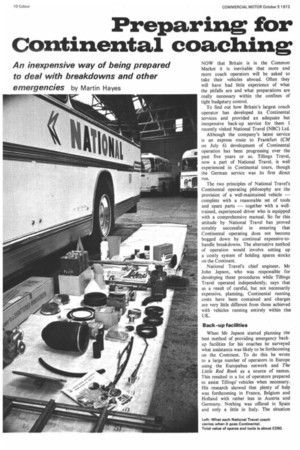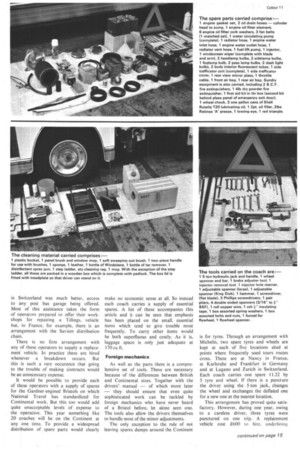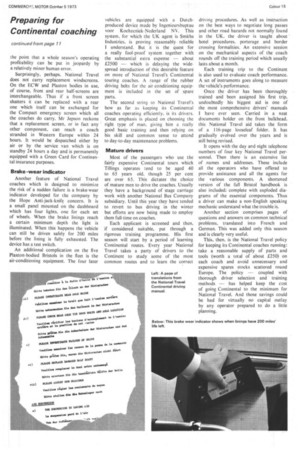Preparing for Continental coaching
Page 76

Page 77

Page 81

If you've noticed an error in this article please click here to report it so we can fix it.
An inexpensive way of being prepared to deal with breakdowns and other emergencies by Martin Hayes
NOW that Britain is in the Common Market it is inevitable that more and more coach operators will be asked to take their vehicles abroad. Often they will have had little experience of what the pitfalls are and what preparations are really necessary within the confines of tight budgetary control.
To find out how Britain's largest coach operator has developed its Continental services and provided an adequate but inexpensive back-up service for them I recently visited National Travel (NBC) Ltd.
Although the company's latest service is an express route to Frankfurt (CM on July 6) development of Continental operation has been progressing over the past five years or so. Tillings Travel, now a part of National Travel, is well experienced in Continental tours. though the German service was its first direct run.
The two principles of National Travel's Continental operating philosophy are the provision of a well-maintained vehicle — complete with a reasonable set of tools
and spare parts together with a welltrained, experienced driver who is equipped with a comprehensive manual. So far this attitude by National Travel has proved notably successful in ensuring that Continental operating does not become bogged down by continual expensive-tohandle breakdowns. The alternative method of operation would involve setting up a costly system of holding spares stocks on the Continent.
National Travel's chief engineer, Mr John Jepson, who was responsible for developing these procedures while Tillings Travel operated independently, says that as a result of careful, but not necessarily expensive, planning, Continental running costs have been contained and charges are very little different from those achieved with vehicles running entirely within thee UK.
Back-up facilities
When Mr Jepson started planning the best method of providing emergency backup facilities for his coaches he surveyed what assistance was likely to be forthcoming on the Continent. To do this he wrote to a large number of operators in Europe using the Europabus network and The Little Red Book as a source of names. This resulted in a list of operators prepared to assist Tillings' vehicles when necessary. His research showed that plenty of help was forthcoming in France, Belgium and Holland with rather less in Austria and Germany. Nothing was offered in Spain and only a little in Italy. The situation in Switzerland was much better, access to any post bus garage being offered. Most of this assistance takes the form of operators prepared to offer (heir workshops for repairing a Tillings. vehicle but, in France. for example, there is an arrangement with the Saviem distribution chain.
There is no firm arrangement with any of these operators to supply a replacement vehicle. In practice these are hired whenever a breakdown occurs. But this is such a rare occurence that going to the trouble of making Contracts would be an unnecessary expense.
It would be possible to provide each of these operators with a supply of spares for the Gardner-engined Bristols on which National Travel has standardized for Continental work. But this too would add quite unacceptable levels of expense to the operation. This year something like 20 coaches will be on the Continent at any one time. To provide a widespread distribution of spare parts would clearly make no economic sense at all. So instead each coach carries a supply of essential spares. A list of these accompanies this article and it can be seen that emphasis has been placed on the small. essential items which tend to give trouble most frequently. To carry other items would be both superfluous and costly. As it is, luggage space is only just adequate at 170 cu ft.
Foreign mechanics As welt as the parts there is a comprehensive set of tools. These are necessary because of the differences between British and Continental sizes. Together with the drivers'. manual — of which more later — they should ensure that even quite sophisticated work can be tackled by foreign mechanics who have never heard of a Bristol before, let alone seen one. The tools also allow the drivers themselves to handle most of the minor adjustments.
The only exception to the rule of not leaving spares dumps around the Continent is for tyres. Through an arrangement with Michelin, two spare tyres and wheels are kept at each of five locations sited at points where frequently used tours routes cross. These are at Nancy in France, at Karlsruhe and Frankfurt in Germany and at Lugano and Zurich in Switzerland. Each coach carries one spare 11.22 by 5 tyre and wheel. If there is a puncture the driver using the 5-ton jack, changes the wheel and exchanges the deflated one for a new one at the nearest location.
This arrangement has proved quite satisfactory. However, during one year, owing to a careless driver, three tyres were punctured on one trip. A replacement vehicle cost £600 to hire. underlining the point that a whole season's operating profitability can be put in jeopardy by a relatively minor human error.
Surprisingly, perhaps. National Travel does not carry replacement windscreens. On the ECW and Plaxton bodies in use, of course, front and rear half-screens are interchangeable. Thus if a front screen shatters it can be replaced with a rear one which itself can be exchanged for the Compact emergency screen which all the coaches do carry. Mr Jepson reckons that a replacement screen, or in fact any other component, can reach a coach stranded in Western Europe within 24 hours, It would be dispatched either by air or by the service van which is on standby 24 hours a day and is permanently equipped with a Green Card for Continental insurance purposes.
Brake -wear indicator Another feature of National Travel coaches which is designed to minimize the risk of a sudden failure is a brake-wear indicator developed for the company by the Hope Anti-jack-knife concern. It is a small panel mounted on the dashboard which has four lights, one for each set of wheels. When the brake linings reach a certain minimum depth the light is illuminated. When this happens the vehicle can still be driven safely for 200 miles before the lining is fully exhausted. The device has a test switch.
An additional complication on the five Plaxton-bodied Bristols in the fleet is the air-conditioning equipment. The four later vehicles are equipped with a Dutchproduced device made by Ingenieursbuptau voor KoeltecniekNederland NV. This system. for which the UK agent is Smiths Industries, is proving reasonably reliable I understand. But it is the quest for a really fool-proof system together with the substantial extra expense — about £2500 — which is delaying the widespread introduction of this desirable feature on more of National Travel's Continental touring coaches. A range of the rubber driving belts for the air-conditioning equipment is included in the set of spare parts.
The second string to National Travel's bow as far as keeping its Continental coaches operating efficiently. is its drivers. Great emphasis is placed on choosing the right type of man, giving him a really good basic training and then relying on his skill and common sense to attend to day-to-day maintenance problems.
Mature drivers
Most of the passengers who use the fairly expensive Continental tours which Tillings operates tend to be aged 40 to 65 years old. though 25 per cent are over 65. This dictates the choice of mature men to drive the coaches. Usually they have a background of stage carriage work with another National Bus Company subsidiary. Until this year they have tended to revert to bus driving in the winter but efforts are now being made to employ them full-time on coaches.
Each applicant is screened and then. if considered suitable, put through a rigorous training programme. His first season will start by a period of learning Continental routes. Every year National Travel takes a party of drivers to the Continent to study some of the most common routes and to learn the correct driving procedures. As well as instruction on the best ways to negotiate long passes and other road hazards not normally found in the UK, the driver is taught about " hotel procedures. porterage and border crossing formalities. An extensive session on the mechanical aspects of the coach rounds off the training period which usually lasts about a month.
Each training trip to the Continent is also used to evaluate coach performance. A set of instruments goes along to measure the vehicle's performance.
Once the driver has been thoroughly trained and been assigned his first trip. undoubtedly his biggest aid is One of the most comprehensive drivers' manuals 1 have ever seen. Carried in a neat documents holder on the front bulkhead. this National Travel aid takes the form of a 116-page looseleaf folder. It has gradually evolved over the years and is still being revised.
It opens with the day and night telephone numbers of four key National Travel personnel. Then there is an extensive list of names and addresses. These include all the operators who have offered to provide assistance and all the agents for the various components. A shortened version of the full Bristol handbook is also included; complete with exploded diagrams of the essential components. Thus a driver can make a non-English speaking mechanic understand what the trouble is.
Another section comprises pages of questions and answers on common technical problems, translated into French and German. This was added only this season and is clearly very useful.
This, then, is the National Travel policy for keeping its Continental coaches running: take a reasonable supply of parts and tools (worth a total of about £250) on each coach and avoid unnecessary and expensive spares stocks scattered round Europe. The policy — coupled with thorough driver selection and training methods — has helped keep the cost of going Continental to the minimum for National Travel. And those savings could be had for virtually no capital outlay by any operator prepared to do a little planning.
















































































































































